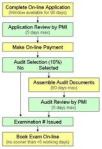Note: In June 2019, PMI announced the exam change would occur on the 15th December 2019 – this date has now been deferred by PMI to 30th June 2020.
PMI have announced the biggest change in the PMP exam since the change to a 200 question format last century!
The just released PMP® Exam Content Outline has radically reformed the examination to reflect the diverse skills and approaches needed by project managers to deliver outcomes and value to their organizations. The new exam will cover both predictive (~50%) and agile/hybrid (~50%) approaches to project management (the current exam is 90%+ predictive); this change will bring the Agile Practice Guide, bundled with the PMBOK® Guide 6th Edition into the exam.
Of equal significance, the domains and tasks that frame the examination have been completely reorganized to align with real-life practices. The number of domains will be reduced from five to three. Specific project management approaches will not be aligned to individual domains, but will be incorporated throughout the exam. The new domains are:
People (42%): emphasizing the skills and activities associated with effectively leading a project team.
Process (50%): reinforcing the technical aspects of managing a project.
Business Environment (8%): highlighting the connection between projects and organization strategy.
Predictive, agile and hybrid approaches, will be included across the three exam domains. The best way to understand what is included in the exam is to review the updated Exam Content Outline, download from: https://www.pmi.org/certifications/types/project-management-pmp/exam-prep/changes
Given the extent of these changes, anyone studying current course material will need to have passed their PMP exam by December, or face a completely new course of study. Based on previous changes to the PMP exam there is no leeway, exams taken on or before the 15 December will be the current exam, those taken on or after the 16 December will be the new exam (including any deferrals and re-sits).
This shift in the PMP exam is focused on supporting information technology and business organizations, reflects the needs of most current PMI members, and should be applauded. However, from our perspective, the shift is moving the core of the exam into areas we have no specific skills in.
My career has focused on supporting major engineering, construction and defense projects which require disciplined project controls. And while we can rewrite our materials, our core differentiation has always been the fact we are not just a training organization, rather we have real-world experience that we can bring into our courses.
Consequently, we have decided to pull out of the PMP training market at the end of this year to focus on courses where we still have core real-world knowledge and experience including:
- PMI-SP: we are one of the few organizations world-wide teaching this course and the only one with an international reputation in project controls and scheduling – see more.
- EVM: our new EVM short course is designed for people who need to understand the concepts of Earned Value based n the ISO 21508 standard – see more.
In the meantime – if you are interested in obtaining the PMP credential you have a 5-month window to sit the current exam we all know and understand – see more.
Leading up to the exam we are in ‘known territory’ – PMI use a normal distribution to determine the cut off for pass-fail. The number of candidates does not change the score, it is the ‘average’ score and the distribution of scores in any given period that sets the cut off. This adjustment is necessary because the questions in the exam change regularly and PMI are seeking to balance the degree of difficulty over time. We know how this works and what a ‘pass’ looks like in our training course. The last part of 2019 will be busy given the scope of the change in the PMP exam but that’s all. Come December the 15th no one will really know what the requirements are for several months……
















